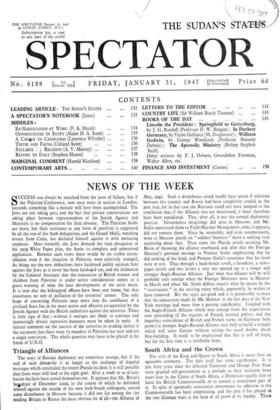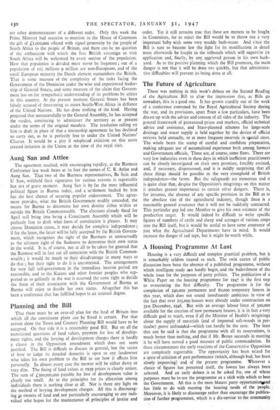South Africa and the Crown
The visit of the King and Queen to South Africa is more than an agreeable ceremony. The date itself has some significance. It is just forty years since the defeated Transvaal and Orange Free State were granted self-government as a prelude to their inclusion three years later in the Union of South Africa, a Dominion equally free to leave the British Commonwealth or to remain a constituent part of it In spite of spasmodic secessionist movements its adhesion to the Commonwealth has been unhesitating, and the part it has played is the two German wars is the best of all proof of its loyalty. Them
are other demonstrations of a different order. Only this week the Prime Minister had occasion to mention in the House of Commons the gift of £r,000,000 offered with signal generosity by the people of South Africa to the people of Britain, and there can be no question of the enthusiasm with which the first British sovereign to visit South Africa will be welcomed by every section of the population. How that population is divided must never be forgotten ; out of a population of millions 9 million are non-Europeans, and of the small European minority the Dutch element outnumbers the British. That is some measure of the complexity of the tasks facing the Government of the Dominion under the wise and experienced leader- ship of General Smuts, and some measure of the claim that Govern- ment has on the sympathetic understanding of its problems by critics in this country. At the present moment General Smuts has been falsely accused of threatening to annex South-West Africa in defiance of the United Nations. He has ,done nothing of the kind. Having proposed that unsuccessfully to the General Assembly, he has accepted the verdict, continuing to administer the territory as at present under the terms of the original mandate. The resolution calling on him to draft in place of that a trusteeship agreement he has declined to carry out, as he is perfectly free to under the United Nations' Charter. It would be a pity if misplaced criticism on this score created irritation in the Union at the time of the royal visit.



































 Previous page
Previous page